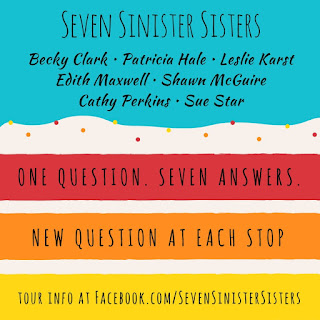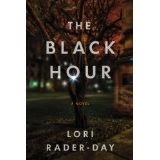Unifying Themes – Seven Sinister Sisters Tour
Seven mystery authors; seven new releases; seven answers to a central question
at each stop on our tour. The Stiletto Gang is our second stop and our question
this week is…
there a theme underlying or unifying your books?
Perkins’ Holly Price mystery series revolves around family and loyalty.
After her father cliches a midlife brain-fart and absconds with his yoga
instructor, Holly agrees to temporarily return to her hometown in order to keep
the family business afloat. Clients can do the damnedest things, however,
making her question all relationships.
With the next book in the series, In It
For The Money, Holly’s cousin is the catalyst for her involvement in
another murder investigation. Refusing to believe the rumors flying around the
extreme sport circuit about his alleged treachery, she follows the money –
another consistent theme – to find the actual villain.
Star
also writes about families in chaos. Nell Letterly is a menopausal single
mom, trying to raise her teenage daughter, as well as fielding well-intended
interference from the rest of the family, including Gramps and Nell’s
fashionista, soon-to-be ex sister-in-law. They all disagree how a teenager
should be raised, but as a family they have a special bond. In Murder by
Moose, Nell tries to protect her family from a killer on the loose while
she teaches a self-defense class at a dude ranch in the mountains. But when the
going gets tough, the family always comes together to help Nell solve the
mystery.
Slashed Browns—as in the series as a whole—Edith Maxwell (writing as Maddie
Day) expands this family theme to community. How do friends and family
rally ’round when someone is at risk or wrongly accused? How does a country
store breakfast-and-lunch restaurant serve as a focal point for the community,
a gathering place? In this particular book, the father of one of her
protagonist’s employees is accused of murder. This motivates Robbie Jordan and
others in the small town of South Lick, Indiana to work together to find out
who is the killer.
concerns issues of truth and justice. Equally important, however, are themes of
family and the food movement, and how the two create a conflict between
Sally and her father. The Solaris are descended from one of the original
Italian fishermen who arrived in Santa Cruz in the 1890s, and Sally’s dad is
fiercely proud of the family’s traditional Italian seafood restaurant on the
historic wharf. When Sally inherits her
aunt’s trendy restaurant, Gauguin, her father—hurt
that Sally no longer wants to work at Solari’s—becomes convinced she now looks
down on her family heritage.
Clark takes a different tack in her new series, the Mystery
Writer’s Mysteries series. Officially, all the books are set in the world of a
mystery author, so with Fiction Can Be
Murder, she pulls back that curtain for her readers. Unofficially, her
books always have the same underlying current, that of the reluctant hero. It
seems she likes to explore characters who are going about their boring, normal
lives when — BLAMMO — something bizarre happens to them. They’re way out of
their comfort zone and flounder for a while before forcing themselves to pull
up their big-girl undies and fix whatever the problem is.
always show up in Shawn McGuire’s work.
First, relationships – whether between family members, romance, best friends,
parent and child, co-workers, etc. – are a prime element to the story. Second,
there’s always humor of some kind because even in the most intense situations,
humor helps. Third, an element of truth or finding your path in life often
shows up. Then with each book, a theme unique to that story or series will
appear. With her Whispering Pines series, while she hadn’t originally planned
it, religion turned out to be a strong theme.
series, Pat Hale says religion plays
an underlying role. In The Church of
the Holy Child, (September 2017) the serial killer torments a priest
with information on the murders, knowing he’s bound by his holy orders not to
reveal what’s heard in the confessional. In Durable Goods, (April 15, 2018) young girls are drawn into a
sex trade organization under the guise of coming to a religious refuge for
indigent women. The sub-theme of both books considers the confines and
constructs found within religious doctrine and their use for good and
evil.
readers for joining our tour. We’re happy to address any comments or questions.
And feel free to contact any of us through our websites. Our next stop
will be January 25th with MJB Reviewers. See you there!
celebrate our new releases, the Seven Sinister Sisters are having a giveaway!
lucky winners will receive an ebook from one of us.
GRAND PRIZE winner will receive a signed copy from each of us!
April 30th and we’re answering a different question at each blog.
Leave a comment at each blog for more entries! We’ll draw the winner from all
the combined comments at the end of our tour.
Watch
our Facebook page for the next stop on the tour.















